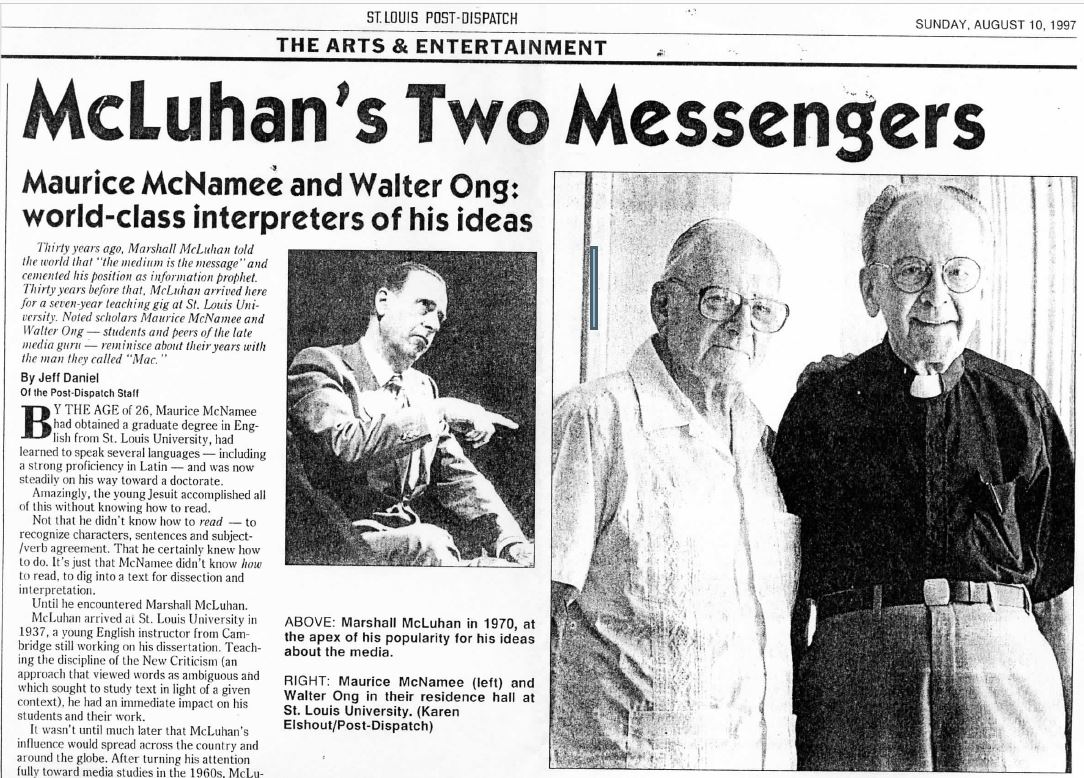In 1997, Maurice McNamee, SJ, then 88, and Walter Ong, SJ, 84, sat for an interview with Jeff Daniel of the The St Louis Post-Dispatch. He reported their recollections of Marshall McLuhan from over 50 years before in ‘McLuhan’s Two Messengers’.1
“He had precocious insights,” Ong recalled, “but he didn’t always know entirely what he was saying.” (…) He was a pleasant guy, his two former students remember, one who always seemed to be performing, but never in a self-conscious way. Pleasant, yet intense. Always in control. “Always looking for pay dirt,” Ong recalled. “We would do things with him socially, but even then, he would dominate everything around him,” continued Ong, whose master’s thesis was directed by McLuhan. He broke into a laugh. “Everything was at loose ends when he was around — everything was kind of tentative.” McNamee also had McLuhan as a dissertation director, and he soon found out just what the Canadian-born, Cambridge-educated “Mac” meant by “direction.” “Mac’s directing of my dissertation consisted of coming into that building right over there, plopping himself down on the bed, and talking for three hours a night about his own studies,” McNamee said through a fit of laughter.”He was working on his own dissertation, but he encouraged me to use his methods on my work. So in the end, it was a perfect pairing.”2 (…) Like Ong, McNamee realizes that the relationship with McLuhan was often reciprocal. Although they were mentor and student, they were often peers in many instances. (If McLuhan — who died in 1980 — were still living, he’d fall right between Ong and McNamee in age.) “He would listen to you, but he was exactly like my dissertation subject, Francis Bacon — he would never acknowledge his sources,” McNamee said. “When he was speaking, it was if all of this had come from divine inspiration directly to Mac,” he continued. “He had this tremendous ability to synthesize information, but he would sometimes use something he got from us when presenting his insights [back to us]. And I honestly don’t think he ever even realized it.” (…) As Ong remembers it, McLuhan had incredible abilities, such as approaching any subject, from Socrates to Herbert Hoover, with intense resolve. His understanding was intuitive, but never easily explained. “He never cared to explain most things,” Ong said.
- ‘McLuhan’s Two Messengers — Maurice McNamee and Walter Ong, world-class interpreters of his message’, St Louis Post-Dispatch, August 10, 1997, 4C. The McLuhan recollections of McNamee and Ong accord closely with those of their Jesuit colleague, R.C. Williams: see Assessment of McLuhan. ↩
- McNamee in his autobiography: “what he (McLuhan) had done on Thomas Nashe’s background and on the consequences of this background on Nashe’s several prose styles was precisely what he wanted me to do on Francis Bacon. It worked out perfectly. I followed up on the primary and secondary sources he recommended, and he came back each week for another chat on what I had absorbed. But whether my work on Bacon did or did not add much to a better understanding of his work, I am very grateful to Marshall McLuhan for pushing me into the study and guiding me throughout it”, Maurice McNamee, SJ, Reflections in Tranquility, 2001. ↩
